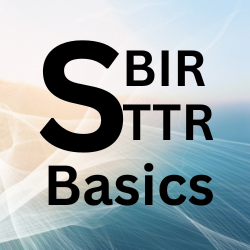SBIR and STTR Recipients are required to comply with various federal regulations and policies. Below is a list of common compliance requirements for SBIR and STTR recipients:
Eligibility Requirements
-
- Small Business Status: The applicant must be a small business as defined by the SBA (generally fewer than 500 employees).
- Principal Investigator (PI) Employment: The PI’s primary employment must be with the small business for the duration of the project.
- Ownership and Control: The small business must be at least 51% owned and controlled by U.S. citizens or permanent residents.
Subcontracting Limitations: The small business must perform at least 2/3 of the work in Phase I SBIR, at least 50% of Phase II for SBIR projects, and 40% for STTR Phase I and II projects. The small business determines the level of effort based on the total R&D direct costs it performs and the funds spent with subrecipients and subcontractors on R&D efforts.
Financial Compliance
-
- Cost Principles: SBIR/STTR recipients must follow the cost principles outlined in 2 CFR 200 (Uniform Administrative Requirements, Cost Principles, and Audit Requirements for Federal Awards).
- Allowable Costs: Costs must be allowable, allocable, and reasonable under federal regulations.
- Recordkeeping: Maintain accurate and complete financial records detailing federal funds’ expenditures.
- Audit Requirements: If recipients expend over $1,000,000 in federal funds in a fiscal year, they must undergo a single audit.
Reporting Requirements
-
- Progress Reports: Periodic reports on the research progress must be submitted, often quarterly or semi-annually.
-
- Final Report: At the end of the project, the recipient must submit a comprehensive final report detailing the research results and commercialization efforts.
- Patent and Invention Reporting: If the project develops a new invention or patent, the recipient must file reports with the relevant agency (e.g., SBIR/STTR Progress and Invention Report).
Performance and Milestone Compliance
-
- Milestones and Deliverables: The recipient must meet project milestones and deliverables outlined in the grant or contract agreement. Failure to do so could result in termination or suspension of the award.
- Research Scope and Timeline: The research and development must stay within the scope, timeline, and budget agreed upon in the initial proposal.
Commercialization and Technology Transfer
-
- Commercialization Plans: Many agencies require recipients to submit a commercialization plan detailing how to transition the developed technology into the marketplace.
- Data Rights and Intellectual Property (IP): The company must comply with regulations governing the protection and use of intellectual property, including patents, trademarks, and data.
-
- Technology Transfer: STTR recipients must collaborate with a nonprofit research institution and ensure technology transfer as part of the agreement.
Compliance with Federal Laws and Regulations
-
- Buy American Act: SBIR/STTR recipients must comply with the Buy American Act and ensure they perform a significant portion of the work using U.S.-made materials.
- Export Control Regulations: Certain technologies require recipients to comply with U.S. export control laws, such as the International Traffic in Arms Regulations (ITAR) and Export Administration Regulations (EAR).
- Human and Animal Research Regulations: If the research involves human or animal subjects, compliance with relevant protections and guidelines (e.g., IRB approval, Institutional Animal Care and Use Committee (IACUC) approval) is necessary.
Equal Opportunity and Non-Discrimination
-
- Non-Discrimination: SBIR/STTR recipients must comply with federal regulations prohibiting discrimination based on race, color, national origin, gender, disability, or age.
- Affirmative Action: Depending on the company’s size, recipients must comply with Equal Employment Opportunity (EEO) requirements and may be required to implement affirmative action programs.
Environmental and Safety Regulations
-
- Environmental Protection: Compliance with environmental regulations is required if the research or development involves hazardous materials or impacts the environment (e.g., Environmental Protection Agency (EPA) regulations).
- Safety Standards: Adherence to safety and workplace regulations, such as those governed by OSHA (Occupational Safety and Health Administration), is required to ensure the health and safety of employees.
Conflict of Interest
-
- Disclosure: Recipients must disclose any potential conflicts of interest in their research, business practices, or financial dealings related to the project.
- Conflict of Interest Policies: A formal conflict-of-interest policy must ensure transparency and fairness in project execution.
Program-Specific Compliance
-
- Agency-Specific Requirements: Each federal agency (e.g., NIH, NSF, DoD) may have specific compliance requirements related to the SBIR/STTR programs that must be adhered to. It is essential to review the particular agency guidelines for additional obligations.
- Fast Track and Direct-to-Phase II: If applying for Fast Track or Direct-to-Phase II, specific criteria and additional compliance requirements may apply, such as more stringent reporting or performance metrics.
Closeout Procedures
-
- Final Financial Reporting: At the end of the project, recipients must submit a final financial report detailing how they spent the funds and demonstrating compliance with the budget.
- Property and Equipment Reporting: If recipients use federal funds to acquire significant equipment or property, they must submit a report detailing the disposition or use of the property.
- Final Performance Report: A final report summarizing the results of the project and commercialization efforts is typically required.
Subcontracting Compliance
-
- Subcontracting Plan: If subcontracting is involved, recipients may need to provide a subcontracting plan or report detailing the use of subcontractors, particularly for more significant awards.
- Small Business Utilization: Many agencies require recipients to subcontract with other small businesses, minority-owned businesses, or other underrepresented groups.
Key Notes
-
- Non-compliance with any of the above requirements can lead to the cancellation of funding, legal action, or future ineligibility for federal grants.
- Always refer to the specific SBIR or STTR agency’s program solicitation and the contract or grant agreement for detailed compliance guidelines.
For specific requirements based on the agency (e.g., DoD, NIH, NSF), review that agency’s detailed guidance.
References
-
- Small Business Administration (SBA). (2020). Small Business Size Standards. Retrieved from https://www.sba.gov
- Code of Federal Regulations (CFR). (2020). 2 CFR 200 – Uniform Administrative Requirements, Cost Principles, and Audit Requirements for Federal Awards. Retrieved from https://www.ecfr.gov
- National Institutes of Health (NIH). (2021). SBIR/STTR Policy and Compliance Guidance. Retrieved from https://www.nih.gov
- National Science Foundation (NSF). (2021). SBIR/STTR Proposal & Award Policies & Procedures Guide. Retrieved from https://www.nsf.gov
- Department of Defense (DoD). (2021). SBIR/STTR Funding Opportunities and Compliance Requirements. Retrieved from https://www.defense.gov
- Export Administration Regulations (EAR). (2020). S. Department of Commerce Export Control Regulations. Retrieved from https://www.bis.doc.gov
- International Traffic in Arms Regulations (ITAR). (2020). S. Department of State, Directorate of Defense Trade Controls. Retrieved from https://www.pmddtc.state.gov
- Environmental Protection Agency (EPA). (2021). Environmental Regulations for Research Projects. Retrieved from https://www.epa.gov
- Occupational Safety and Health Administration (OSHA). (2021). Workplace Safety Standards and Regulations. Retrieved from https://www.osha.gov
- Federal Acquisition Regulation (FAR). (2020). FAR Subpart 31 – Contract Cost Principles and Procedures. Retrieved from https://www.acquisition.gov
- Buy American Act. (2020). S. Department of Labor Guidance on Buy American Requirements. Retrieved from https://www.dol.gov
- Federal Agency Specific Guidelines. (2020). Agency-Specific Compliance Requirements for SBIR and STTR Programs. Retrieved from https://www.sbir.gov
- S. Department of Agriculture (USDA). (2020). SBIR/STTR Program Guidance for Agricultural Research. Retrieved from https://www.usda.gov
- Office of Management and Budget (OMB). (2020). Circular A-133: Audits of States, Local Governments, and Nonprofit Organizations. Retrieved from https://www.whitehouse.gov/omb
- Intellectual Property Rights (IPR) and Technology Transfer. (2020). SBIR/STTR Guidelines on Technology Transfer and Intellectual Property Rights. Retrieved from https://www.sbir.gov
.

